Performed in Japanese with English supertitles, the US premiere of The Hunting Gun, a stage adaptation by Serge Lamothe of acclaimed Japanese author and poet Yasushi Inoue’s 1949 novella, now playing a limited Off-Broadway engagement at Baryshnikov Arts Center, slowly reveals the devastating effects of a thirteen-year love affair, as told through three long and anguished letters to a philandering husband from his wife, his paramour, and her daughter. Originally produced in Montreal and Tokyo in 2011, the award-winning tragedy interweaves the experiences, backgrounds, and inter-relationships of the women through three consecutive monologues that recount the contents of their letters, as the man, seen through an upstage scrim covered with passages of Japanese text, silently cleans his eponymous rifle in slow motion for the duration of a show based in words taking aim at past actions that irreparably wounded their hearts.
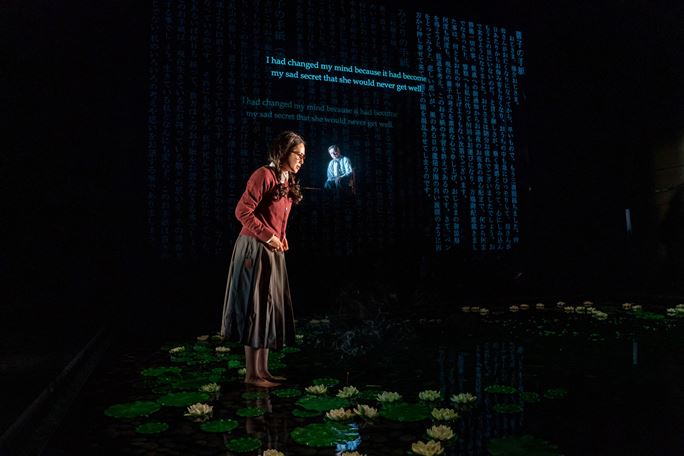
Directed by François Girard, the dark and slow-paced production begins with a voiceover prologue in English that sets the stage for the intimate story of the lonely hunter Josuke Misugi – embodied in the background by Mikhail Baryshnikov – and the shattered women in his life. Without speaking a word, the legendary dancer and actor evinces the impact of the correspondences Misugi received from them, with increasing torment that is readily legible in his emotive body language and pained facial expressions. Miki Nakatani, who was honored with two Best Actress awards for the Tokyo production, returns to the show in the roles of all three women, masterfully capturing their individual voices, ages, personalities, and demeanors, expressing their emotions and perspectives, and transitioning flawlessly from one character to the next, adjusting her hair, switching her costume, and fluently assuming the different identities without ever leaving the stage.
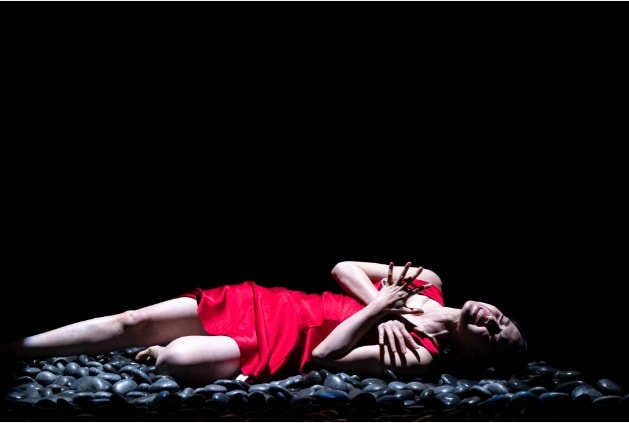
As the young Shoko, Nakatani speaks quickly, with a youthful high voice, as she discloses and reacts, with growing distress, to the secrets she read in her mother’s diary, while walking through a lily pond, lighting incense, and offering prayers. She then removes her schoolish skirt, sweater, and glasses (character-defining costumes by Renée April), and transforms into Misugi’s wife Midori, who, in a slinky red dress and a more mature and sexual tone, describes the infidelities in her cold marriage, lustfully caresses herself, rolls around the ground in its hard and shiny stones, and reaches a crescendo of crying and screaming before stating her intentions for their future. The final letter is a farewell from his soft-spoken, calm, and resolute lover Saiko. As Nakatani removes Midori’s dress, a wooden box floats down onto the stage, now with wooden plank flooring, and she begins the protracted ritual of donning the funeral kimono and accessories inside, as she resolutely prepares to atone for their “great sins” and the pain she caused Shoko and Midori in her desire to be loved. Each characterization is distinctive and compelling, and all affirm the well-deserved acclaim of the international star who delivers them.
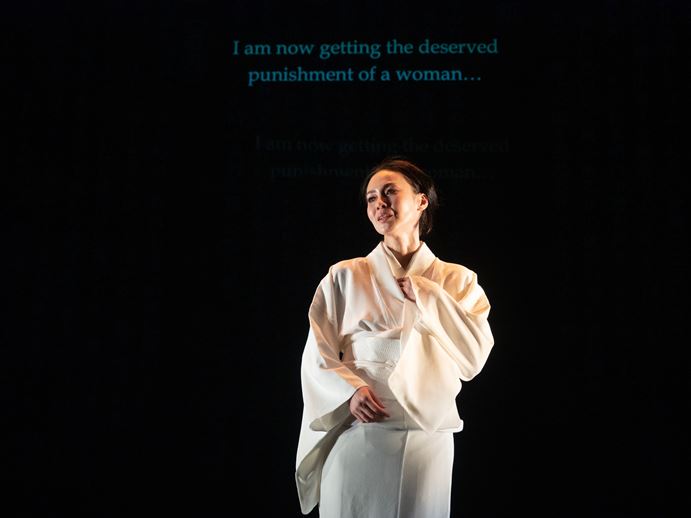
Inoue’s writing, set in the 1930s-40s, is filled with complex feelings and psychological insights, references to nature and the war, and a Zen-like sensibility in his poetic language and metaphors, which is also manifest in François Séguin’s sparse scenic design and the changing floor of the stage, successively composed of the three fundamental elements of water, stone, and wood. David Finn’s spotlighting of the figures in the darkness and original music by Alexander MacSween enhance the evocative minimalist tone. But the recitation of the letters, though skillfully performed, can, at times, feel overly long and redundant, and the story, consequently, moves at a snail’s pace. For me, The Hunting Gun would have a greater impact if some of the monologues were edited and its foregone conclusion not as prolonged.
Running Time: Approximately one hour and 45 minutes, without intermission.
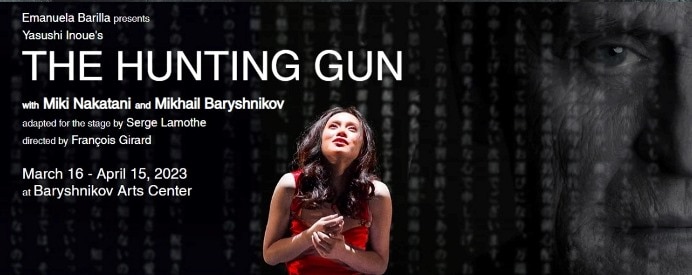
The Hunting Gun plays through Saturday, April 15, 2023, at the Baryshnikov Arts Center, 450 West 37th Street, NYC. For tickets (priced at $35-150, plus fees), go online. Masks are not required.



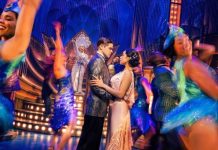

Personally I didn’t think it was too long at all. I was spellbound by Nakatani’s masterful performance and transformations and by the exquisite dissection of these very different affairs of the heart the entire time. I could happily watch it again.